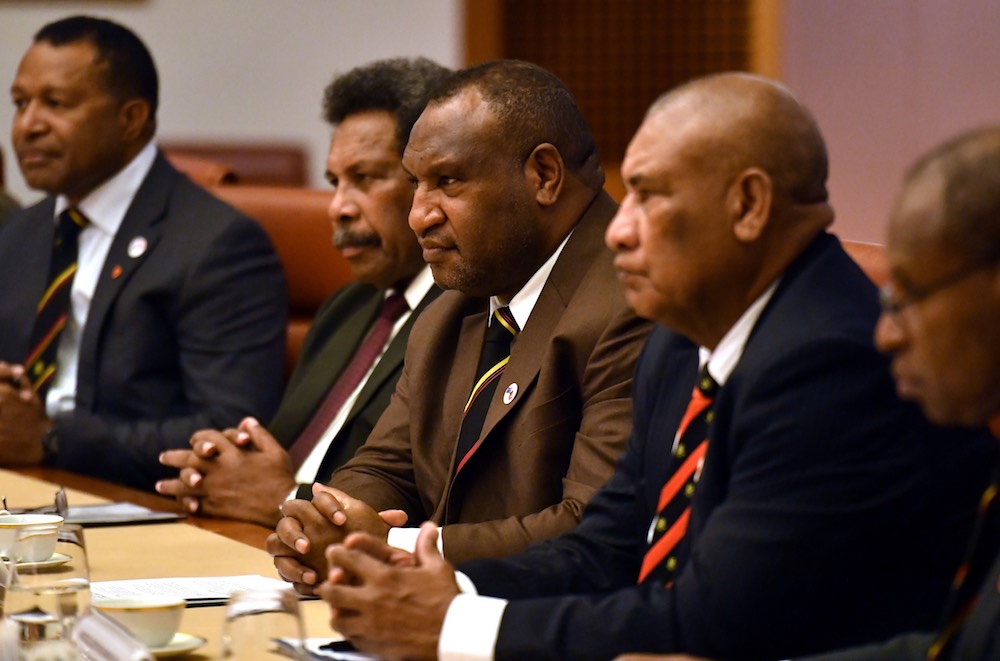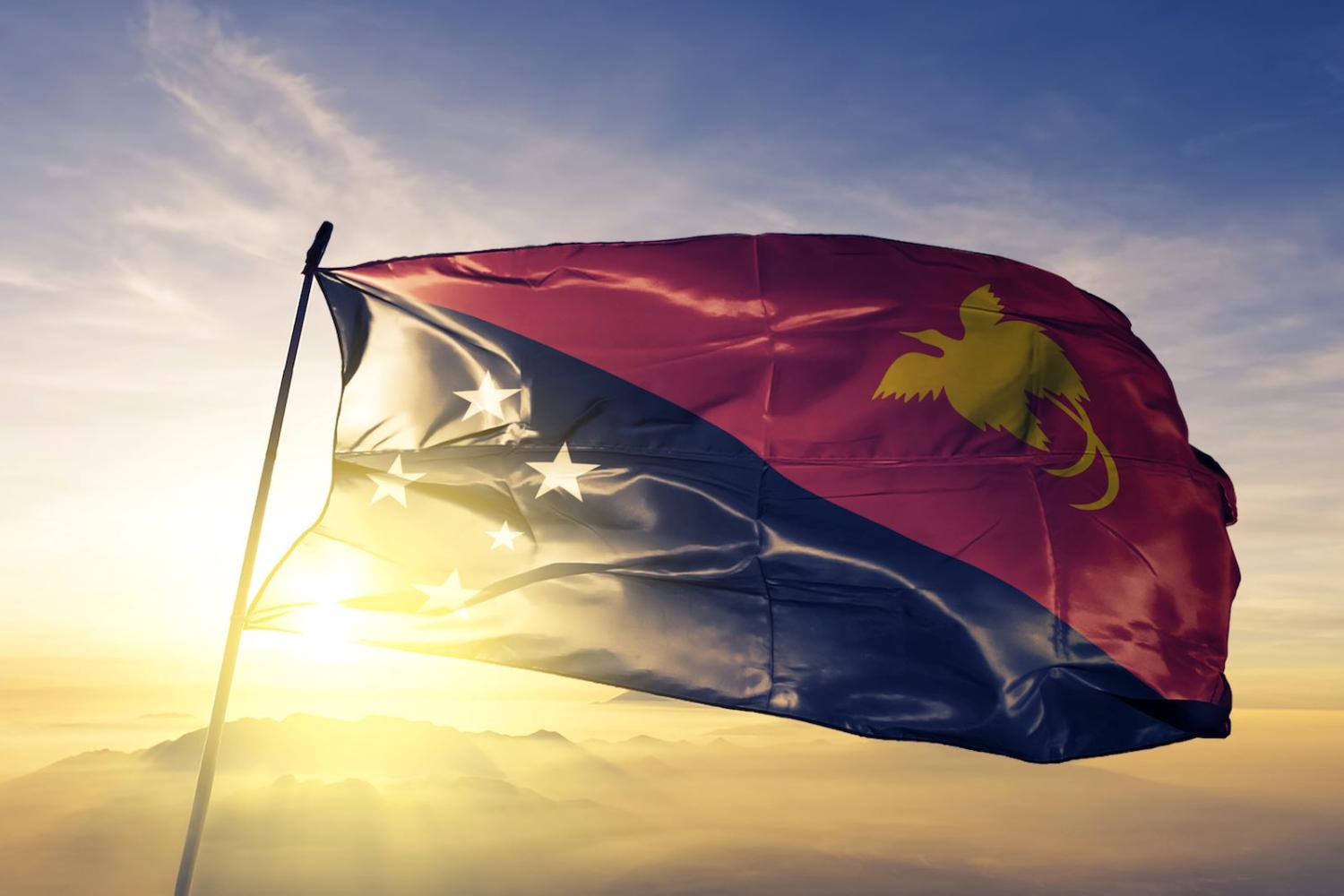The recent announcement of the Papua New Guinea (PNG) Government to cease all negotiations with one of the United States’ largest oil and gas companies, Exxon Mobil, over the P’nyang LNG project, a new gas field in PNG, has broader implications for the US and Papua New Guinea.
At first glance, the decision against Exxon for allegedly acting in bad faith is part of a wider crackdown by the government of Prime Minister James Marape to ensure greater fairness in the resource sector. Since ousting then–Prime Minister Peter O’Neill in a vote of no-confidence in 2019, Marape has charted a different approach from that of his predecessor, under the banner of “Take Back PNG” – a larger policy objective to reassess PNG’s developmental direction and regain lost opportunities. Marape laid out his vision in his inaugural visit to Australia in 2019 and is gradually applying it in many sectors.
The distrust for Exxon has broader implications when one considers Exxon not only represents US economic prestige in the Pacific, but a society whose business ideals are expected to reflect the democratic values of fairness and just outcomes.
The decision illustrates the growing frustrations of dealing with investors in resource-rich PNG, and it further demonstrates an emerging crop of PNG leaders confident in reassessing the status quo. For the US, Exxon’s alleged conduct, criticised by the PNG government as being “exploitative”, undermines US efforts in the Pacific region as a force for good.
Exxon Mobil has a US$19 billion liquefied natural gas project in PNG (PNG LNG), which made its first shipment in 2014. The PNG LNG project, which remains the largest economic investment by the US in the Pacific, coincided with former US President Barack Obama’s announcement in 2012 of a “pivot to the Pacific” policy. The geopolitical scenario of the day, the excitement of having the US interested in PNG, and the high expectations surrounding a global and reputable company, among other factors, influenced the PNG government’s initial agreement for Exxon to operate the PNG LNG project. It was thought the deal would have a transformational impact on PNG’s economy – an assurance that continues to be projected by some quarters.
However, the overall economy of PNG did not experience the projected windfall. Instead, there were a series of negative outcomes over the years at both a national and a local level – national debts grew, and unfavourable benefit-sharing arrangements and royalties led to conflict among traditional resource landowners. Many have questioned whether the resource boom marked by the PNG LNG project was in fact a “resource curse”.
“Absolute bad faith”
The ousting of Prime Minister Peter O’Neill in 2019 was partly a result of growing grievances over the failure to deliver on the promises of the Exxon-led project and other resource deals. An important issue was the high level of concessions made in those deals. Historically, PNG governments, desperate to become investor-friendly, have made hasty concessions that often disadvantaged the country from having a fair share of the revenue from the development of their resources.
In a 2016 report, the International Monetary Fund (IMF) observed that “the tax arrangements for PNG’s mining and petroleum sectors are very generous compared to other resource-rich countries and do not reflect the maturity of the PNG resource sector”. The World Bank, in a 2017 report, also found particularly for the Exxon-led LNG project that Exxon Mobil and its PNG LNG partners created “a complex web of exemptions and allowances that effectively mean that little revenue is received by government and landowners”.
The PNG government must share some burden of fault for creating this scenario – including, for instance, the failures by previous PNG governments to negotiate a favourable outcome for the country, the misuse of funds by political leaders, a politicised bureaucracy unable to carry out their due diligence, and judicial interventions that at times hinder payments to disgruntled landowners.
This does not, however, excuse Exxon and its partners from the grave unfairness suggested in these reports. This, together with his experience as a minister in previous governments, underpinned Marape’s firm stance on taking a different approach in the current deal on the P’nyang LNG project. In his appeal for Exxon Mobil to act fairly, Marape noted that “the initial terms [in the PNG LNG project] provided by PNG were so generous” and that new “reasonable terms” should be considered for the P’nyang project.

The terms proposed by the PNG government are not publicly available, but they appear to include giving no fiscal concessions in P'nyang, treating it as separate project from the current LNG projects and increasing domestic market obligations, local content participation, and landowner’s royalties from the current rate of two percent. The Prime Minister described Exxon’s refusal to accept the terms as a move to “extract even more profit for themselves”, while Kerenga Kua, the Minister for Petroleum and Energy denounced Exxon as acting in “absolute bad faith” and coming into PNG “with a determination to exploit our vulnerabilities, exploit us for our weak economic position and take advantage of us”.
A principled populist
The firm position taken by the Marape government is historic – no previous government has ever taken such an approach. PNG has had resource deals in the past that have resulted unfavourably for the country, but past governments have been shown to align more closely with investors than with their citizens.
The leaders and the people of PNG appear to be supportive of Marape’s approach. Further, the government is considering amending and tightening the legislative framework to ensure an equitable resource sector.
Marape is unlikely to concede to Exxon Mobil, as he insists: “You win for your shareholders, and I win for my people”. James Donald, a Member of Parliament representing the area where P’nyang LNG site is located, cautioned Exxon against crossing “a line between commercial parity and commercial greed”. Other MPs representing the resource areas have also demonstrated support for Marape’s stance against Exxon.
The PNG government is likely to reconsider its current position if Exxon responds positively to its terms. Unless that happens, however, there appears to be a general distrust for Exxon among the people of PNG – a situation far from the hope Exxon represented when it first entered the country. The distrust for Exxon has broader implications when one considers Exxon not only represents US economic prestige in the Pacific, but a society whose business ideals are expected to reflect the democratic values of fairness and just outcomes. The longer this tussle between Exxon and the PNG Government continues, the greater the distrust is likely to be, not only for Exxon, but for what it represents – the United States – in the Pacific.
As the vote of no-confidence scheme against a sitting government in PNG resumes later this year, those affected by Marape’s firm policies may hope for a change in government. In the fluid political landscape of PNG, a populist and comparatively principled Marape faces a challenge beyond just his immediate political rivals, and inside company boardrooms. However, if anything, his approach to governance so far has been reassuring for the people of Papua New Guinea.

